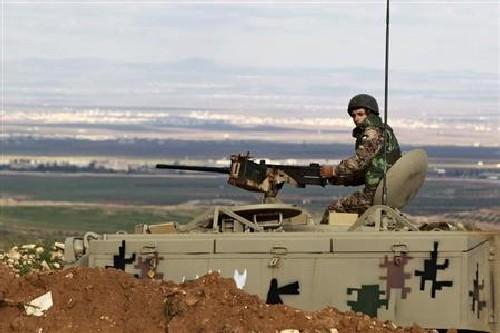AMMAN — Germany’s minister for economic cooperation promised 25 million euros in additional humanitarian aid to Jordan on Monday while calling for a coordination meeting in Brussels to better channel international aid amid a sprawling refugee crisis.
On his first visit to the region, German Economic Cooperation and Development Minister Gerd Müller said his country “valued, recognised and thanked” Jordan for the enormous effort made in dealing with the refugee emergency.
“We very much recognise what you have been doing in the past years and we would like to continue to support you,” Müller said after holding talks with Planning Minister Ibrahim Saif.
“We are able today to commit for another 15 million euros in support of Jordan’s work while addressing the difficult challenges posed by the refugee crisis. We cannot leave Jordan alone. This dramatic task must be shared with the international community and the European Union especially,” he added.
Over the past two years, Germany has provided JD110 million in humanitarian aid to the Kingdom, and ongoing development cooperation projects, especially in the water sector, are worth a total of over JD550 million, according to the German embassy.
Jordan, Lebanon, Turkey and Iraq have taken in the majority of the 2.2 million Syrian refugees, with around 600,000 of them living in the Kingdom, UN figures show, putting a strain on the country’s health and education services, and already scarce water resources.
“The German government supports countries in the region facing the large refugee influx with financial aid and cooperation. We decided to raise the number of Syrian refugees in Germany to 10,000, calling on our European partners to do the same,” Müller told The Jordan Times.
Saif said that among the issues up for discussion were the historical relations between Jordan and Germany and ways to enhance them and the economic repercussions on Jordan becouse of the Syrian crisis.
“We are adopting an economically adjusted programme to overcome the threats posed by unemployment and poverty which [have been] affecting Jordan since even before the Syrian crisis. We look at the next five year agenda trying to identify areas for operations that may prove beneficial to both countries,” Saif told reporters.
Trade between the two countries is worth about JD810 million, with the value of German imports to Jordan worth JD800 million, which leaves room for improvement on the Kingdom’s side, he said.
Welcoming Germany’s proposal for a coordination meeting in Brussels where donors and hosting countries could together work out a strategy to better coordinate international efforts, Saif called for holding the gathering within the first half of 2014.
“Beyond official UNHCR figures, we estimate an additional 400,000 Syrians in Jordan. This large number has been increasingly stoking resentment within the host community that we [have been] able to contain so far with the help of the international community, but we should not lose momentum in our development efforts as this crisis might last for another three to five years,” the minister said.
An additional 10 million euros in aid would support children via UNICEF in a country where some 200,000 Syrian refugees are of school age, but only 80,000 are enrolled in education, often in classrooms with double shifts, UN Children’s Fund figures show.
“Adolescents aged 14 to 17, many of whom had dropped out of school, are especially at risk,” UNICEF’s deputy representative in Jordan, Michele Servadei, told a press conference on Monday in one of UNICEF’s 100 child-friendly spaces in Jordan.
“We are reaching 120,000 children through psycho-social support activities. Centres like these could mean for the children a return to normality,” Servadei said while showing Müller the volunteer’s work in the centre.
An estimated 30,000 Syrian child refugees are working in Jordan, according to UNICEF.
Müller stressed the importance of investing money in children and youths, especially amid crises.
“Children and young people are the most affected by this terrible war and aftermath we are witnessing. We have a deep respect for the volunteers’ work here as the children of today are the adults of tomorrow and the crises of today are the wars of tomorrow.”













